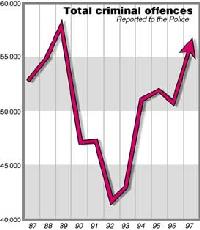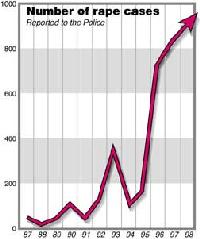 |
Special Assignment01st November 1998Hora-police ties push crime wavesInaction may lead to anarchy or street justiceBy Chris Kamalendran & Faraza Farook |
|
|
As the crime rate in Sri Lanka soars to fearful levels, recent incidents show a disturbing and dangerous trend of police officers providing lethal weapons and other assistance to criminals who are holding the country to ransom. The figures are staggering and shocking. Ten years ago, we had only nine rape cases reported. last years, there were 900 and this year’s figure might top the four figure mark with the recent Rita Manoharan case showing the savage levels to which society has descended. Early this week a policeman of the Muttur Police station was taken into custody at Kantalai with an arms cache. The stock included three Light Machine Gun (LMG) drums, 150 rounds of LMG ammunition, 40 one mm mortar bombs among other things.
The items were being transported in a lorry to Avissawella and Police suspect that the lethal cargo was being smuggled for an underworld gang in Colombo. On Friday at least 80 policemen attached to various police stations in the south were transferred following allegations that they were working hand in glove with criminals. With the increasing crime rate, the use of sophisticated weapons by criminal gangs, the involvement of military deserters in criminal activities, and the sharp increase in unresolved crimes have sent shockwaves among the public. The number of rape cases reported to the Police alone this year uptodate has exceeded 900 as against nine such cases reported to the Police a decade back. Similarly the number of criminal cases reported also has been on the rise with some 56,000 cases last year, an increase of about 5,000 from the figure in 1996. The number of criminal cases being recorded at the Police Headquarters is not the full figure — hundreds or thousands take place unknown, unreported or undetected. Deputy Inspector General H.M.G.B. Kotakadeniya claims the lack of manpower has been the main problem in curbing crime. “We have not been able to maintain the night patrols as we do not have the strength. Most of our men are deployed in the operational areas or placed at road blocks,” he said. But the people feel there is lethargy and mediocrity, with the police saying they have to deal with the terrorist crisis and cannot handle other problems, thus giving the criminals a field day. Many of the complaints made to Police stations go without any follow-up action. The police are supposed to be people-friendly. But today most ordinary people are afraid to step into what they deride as a cop shop. One resident summed up the indifference if not the absurdity of the situation. When he reported a theft to the police, they told him there was little or nothing they could do. Adding insult to inaction, they told him to inform the police if he found the thief. He said the police inaction was encouraging criminals to go for more and bigger plunders. They knew the police would say they did not have enough men. DIG Kotakadeniya disclosed that organised criminals have also started to recruit army deserters who have been trained in the use of modern weapons. “The use of sophisticated weapons in crime is also on the rise as these types of weapons are freely available. Deserters smuggle them in from operational areas and sell them to the underworld gangs,” he said. The Sunday Times also spoke to criminologist and sociologist on the increase of crime and what could be done to tackle it. M.W. Jayasundara, senior lecturer in criminology at Sri Jayewardenepura University, said criminals were taking advantage of loopholes in the law. He recalled his visit to the Bogambara Prison where a prison guard told him, “the only way to reduce crime is to implement the death penalty as done in the time of our kings”. Mr. Jayasundara said he agreed with the prison guard and felt that the death penalty would be an effective deterrent in curbing crime. “Proper punishment is not being administered. Very often criminals get away with no punishment at all,” he lamented. Mr. Jayasundara also said the most disturbing trend in the recent crime wave was the increasing use of violence. The country always had crime but now it was getting violent and brutal. Apart from stringent laws, he said community action was also needed to identify criminal elements or trends. Most of those engaged in criminal activities are in the 20-30 age group — the time when youthful energy is at its highest and could be harnessed for nation building but sadly what we see is devastation and devilry. “They go into crime due to poverty, unemployment or lack of morality,” he said. Mr Jayasundara called for the teaching of the ideology of crimes and why they are committed, as part of the school curriculum. Sociology Professor S.T. Hettige of the Colombo University said, “it is a reflection on indiscipline and lawlessness in the country. We have given the impression that people can do anything and get away.” He said widespread poverty and unemployment made it difficult for most people to earn a sufficient income in a legitimate way. Sexual crimes, incest, child abuse and rape were on the rise. Prof. Hettige said he felt mothers going abroad to earn an extra income leaving their children behind has resulted in the increasing incidence of child abuse and incest. Dealing with another dimension of this trend, he said: “The electronic media arouse human emotions. Television has the ability to invite or restrain people from engaging in sexual crimes and violence”. He also called for new laws and proper monitoring to ensure that the laws were implemented. He said another factor was general indifference and a ‘mind my own business’ factor. Mostly people did not care much about in society and would not act or get involved until something happens to them a family member or a friend. Prof. Kalinga Tudor Silva, sociologist of the Peradeniya University, focusing attention on another area of crime referred to the five-fold increase in the suicides rate, with most of the victims again being in the 20-30 age group. According to Prof. Silva, most of the suicide victims are males and the largest numbers are reported from Hambantota, Kurunegala, Anuradhapura and Polonnaruwa districts. He also attributed three root causes to the rise of suicides — poverty, unemployment and problems specially related to agriculture along with the easy availability of pesticides and weedicides. “Social disruptions associated with resettlement problems leave young people frustrated. People are uprooted from their places of origin mainly in the wet zone,” he said. Senior Superintendent M.A.Kamardeen, now working from the Defence Ministry said most offenders first got involved in petty crimes and then move to dangerous ones. He said most of the miscreants organise themselves while in remand and carry out their plans once released. Thus gang formation often takes place in jails. Today crime is much higher than it was some 10 or 20 years ago. In the past it was a mere pen knife that was used to commit any serious offence. Today the criminals have pistols or automatic weapons. Military Spokesman Sunil Tennekoon commenting on the involvement of deserters and use of weapons issued to the military personnel in various criminal offences claimed that in the military the servicemen are asked to leave their weapons when they go home on leave. But how then do many offenders possess a pistol or grenade generally given to security forces? An army officer who did not wish to be identified told ‘The Sunday Times’ there could be instances where army personnel captured weapons from terrorists. When these troops go home, they leave behind army weapons but could take away the weapons of terrorists without much difficulty. The captured weapons could sometimes be hidden somewhere without being handed over to the authorities. “These men are never checked at checkpoints because they have their service identity card and for the simple reason that they are from the forces,” he said. These servicemen either sell these weapons to nefarious gangs or they themselves engage in criminal activities during the period of leave, he said. Referring to a case he had come across he said, “ this young woman who made a complaint belonged to the elite class. She called me aside and related what happened at her house when five young boys robbed her and raped her. She said that they possessed grenades and locally manufactured pistols called ‘gal kattas’. One of them had taken her husband to the office room in the house and another had got hold of her two daughters and taken them to another room. They had frightened them so as to not make any noise and one of them had taken the woman to the bedroom where he had demanded all the jewellery and cash. Once he took possession of the valuables he had raped her in spite of all her pleas. The rapist was only 17-years-old. She asked me what would be the future of her daughters if she reported the rape. She was also afraid of how her husband would react. She feared that her husband would divorce her.
With the police declaring that they need at least 10,000 more personnel to tackle the crime wave and the possibility of recruiting good people on the decline, Sri Lanka faces a grim situation and dead-end. As a small measure of relief, private security companies have reduced the burden of the police by providing security to companies and also going to the extent of offering their own investigators. However there have been several cases in which the private security men have had links with the criminals. In most cases the security guards are sacked from the job but they are not brought before the law while they make their money by collecting their share from the criminals. With violence at its highest and Sri Lanka having one of the highest killing rates in the world, lawlessness could turn into anarchy if the people lose confidence in the police and resort to street justice. Thus citizens feel instead of taking cover behind excuses, the police must find a way to curb this menace.
|
||

|
|
|
 The
items were reported lost after a terrorist attack early this year and said
to have been taken away by the LTTE.
The
items were reported lost after a terrorist attack early this year and said
to have been taken away by the LTTE.
 “In
such a situation, it is natural if anyone counter attacks the rapist or
even kills him. Yet after such inhuman behaviour the Sri Lankan law is
too soft,” he said.
“In
such a situation, it is natural if anyone counter attacks the rapist or
even kills him. Yet after such inhuman behaviour the Sri Lankan law is
too soft,” he said.
